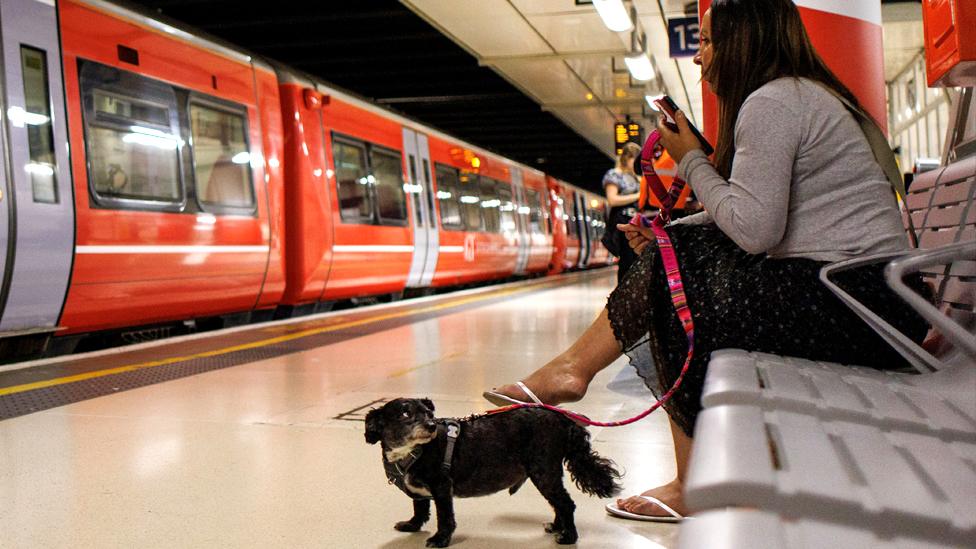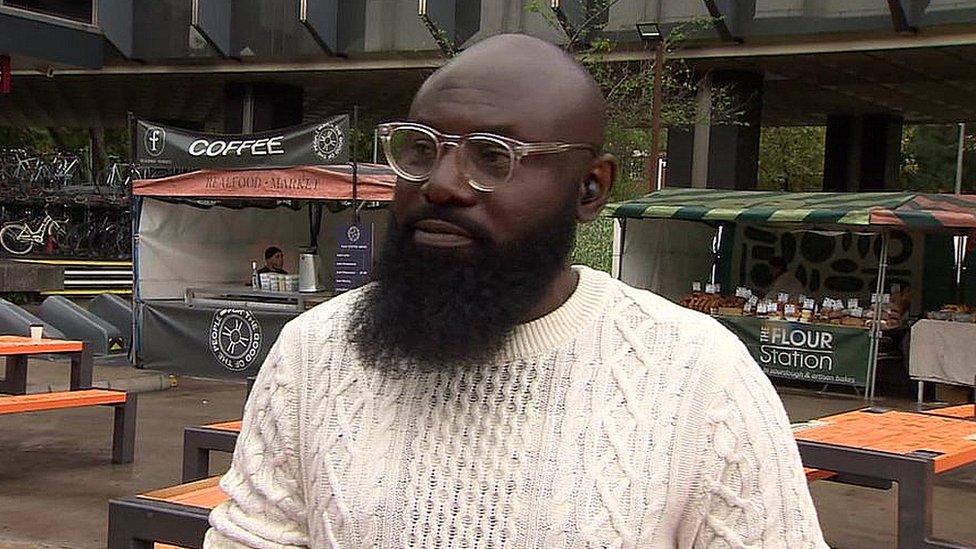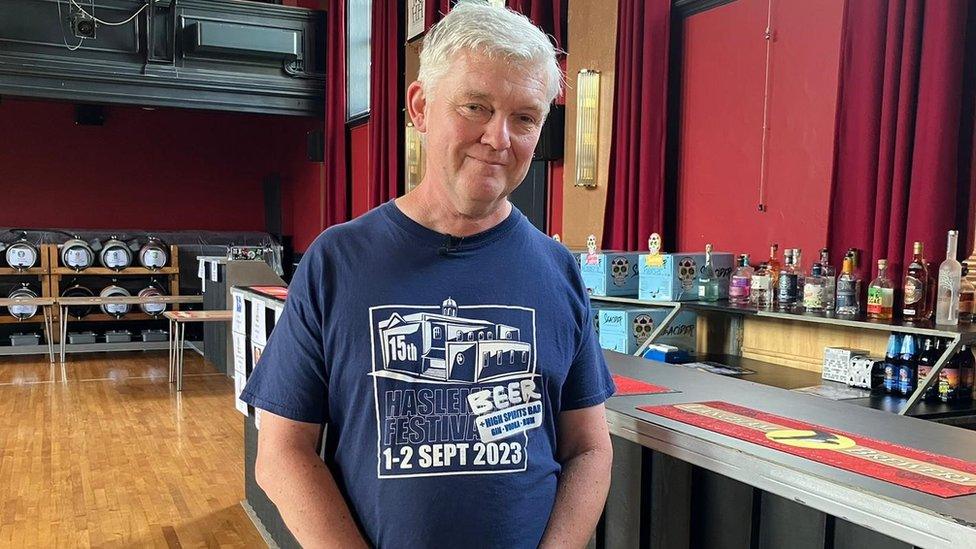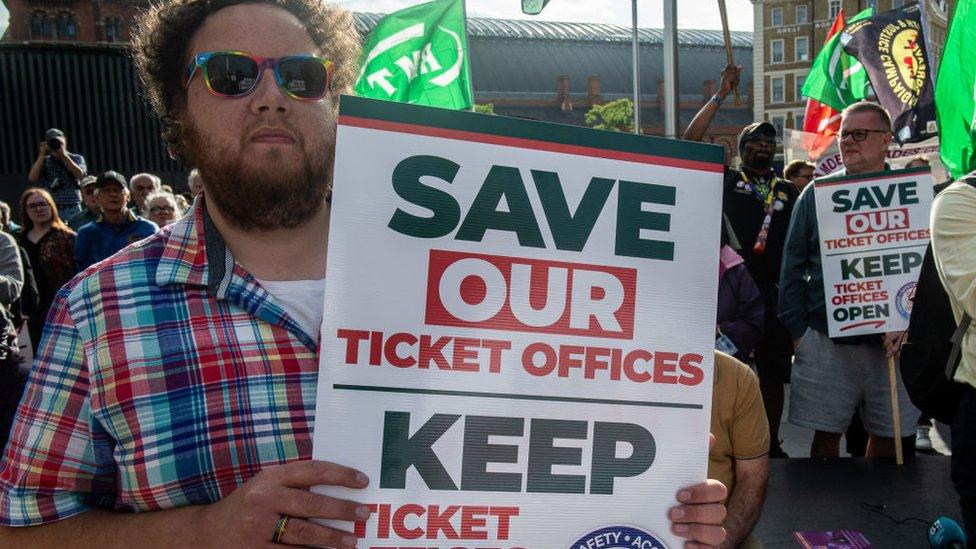Passenger journeys disrupted by train strikes
- Published
- comments

Rail passengers are facing disruption on Saturday as rail workers take part in their latest major strike.
Up to 20,000 RMT union members at 14 operators will walk out on Saturday in a long-running dispute.
Members of train drivers' union Aslef, who work at more than a dozen train companies, walked out on Friday and will refuse to work overtime on Saturday.
Passengers are advised to check their journey before they travel.
Train companies say that service levels will vary across England.
Some journeys into Scotland and Wales will be affected.
On Saturday, fewer than half of trains will be operating and some services will be subject to short-notice cancellation, according to the Rail Delivery Group (RDG), which represents the rail companies.
Some operators did not run any services at all on Friday, including Northern, Avanti West Coast, Transpennine, Southern and Thameslink.
The RDG previously suggested that action was "deliberately designed" to disrupt passengers at the end of their summer holidays and just before the new school term starts.
Workers across 14 different train companies are expected to take part in strikes on Saturday. They are:
Avanti West Coast
c2c
Chiltern Railways
Cross Country Trains
East Midlands Railway
Great Western Railway
Greater Anglia
LNER
Northern Trains
South Eastern
South Western Railway
Transpennine Express
West Midlands Trains
GTR (including Southern, Gatwick Express, Thameslink and Great Northern)
Aslef and the RMT union, which represents other rail workers, have held a series of strikes since last summer which have brought much of the network to a standstill.
Aslef general secretary Mick Whelan said he thought further industrial action was "inevitable".
"This action is being driven as a reaction to how we're being treated by employers, how we're being treated by the government - we have no choice," he told the BBC.
'One strike too many'
For Ataguba Aboje, who hoped to travel from London's Euston station to Shrewsbury, "it is one strike too many in this country".
Now that his train has been cancelled, he will have to extend his 10 day stay in the capital - a cost he had not budgeted for.
"It's awful, it is truly a pain," Mr Aboje told the BBC. "Right now, I don't know what I'm going to do."

Ataguba Aboje said he does not know what to do now his train has been cancelled
But he said that he does not feel the government is doing enough to help train companies and staff to come to a resolution.
"It's disrupted the peace in life and the economy," he said. "Everything is going down."
Aslef is expected to step up its campaign of industrial action in the autumn over pay and proposed changes to working conditions.
Back in the spring, it rejected a two-year offer which would have seen drivers get a backdated pay rise of 4% for 2022 and a 4% increase this year, in exchange for sweeping changes to ways of working.
"[Our members] would much rather be here, fighting for their futures... while seeking a pay rise to put a dent in the cost of living rather than rolling over and having no future at all," Mr Whelan said.

Are you a striking train driver? Or a passenger affected by the industrial action? Get in touch by emailing.
WhatsApp: +44 7756 165803, external
Tweet: @BBC_HaveYourSay, external
Please read our terms & conditions and privacy policy

The RMT also has a mandate to strike until November, but its general secretary Mick Lynch said the union was already preparing to re-ballot workers over further action this autumn and winter.
Unions say any pay offer should reflect the cost of living - with the inflation rate still far above the Bank of England's target of 2%.
Rail Delivery Group spokesman Robert Nisbet said that the government "made it clear to us we need to cut our cost base" after the pandemic changed passenger habits and left the rail industry with a big hole in its finances.
"We don't have as many commuters coming back to the railway as we were expecting, but we do have more leisure travellers and more traffic at weekends," he said.
"That's why we're bringing reform and those discussions to the negotiating table and that's what we want the union to sit down and take seriously."

Simon Labrow's beer festival in Haslemere, Surrey has seen ticket sales plummet 50% because of the train strikes.
"We've run the event for 15 years and this has never happened before at this scale," said Mr Labrow.
Both days of his beer festival are affected by train strikes.
"We were devastated because we have fixed outgoings that we have to spend on the festival in advance and we didn't know this [the strikes] was going to happen".
He said being a 10-minute walk from Haslemere railway station meant many customers came via train - but the strike has deterred many of them. Several of his volunteers were also unable to turn up to run the event as normal, he added.
The industry and the government - which controls what's on the table in the dispute - continue to call for unions to put the latest offers to their members in a vote.
A spokesperson for the Department for Transport said: "It's frustrating to see both Aslef and RMT co-ordinate their strikes with the aim of causing as much disruption as possible on the last weekend of the summer holidays."
They described offers for workers as "fair and reasonable" and said that industrial action "delays the reforms that would ultimately benefit passengers, rail workers and taxpayers."
Ticket office closures
Unions and disability groups have also hit out at other proposed changes to ways of working in the industry, such as ticket office closures.
Currently, nearly 300 stations in England run by train companies with Department for Transport contracts have a full-time staffed ticket office - 708 are staffed part-time. Under the proposals, most would close.
The government-funded watchdog Transport Focus has been collecting public views and industry responses to the proposals before it will decide whether to support or object to the plans.

Unions and disability campaigners have protested the plans to close many ticket offices
It looked at issues such as whether stations will continue to be staffed, accessibility, waiting rooms, toilets and how customers struggling to buy a ticket will receive assistance.
Disability campaigner Katie Pennick told BBC Breakfast that the suggested changes were "completely unreasonable" and that people with mobility impairments, for example, could not be expected to "trek up and down platforms" looking for other staff members who might be able to help with ticket purchases.
Related topics
- Published9 May 2024
